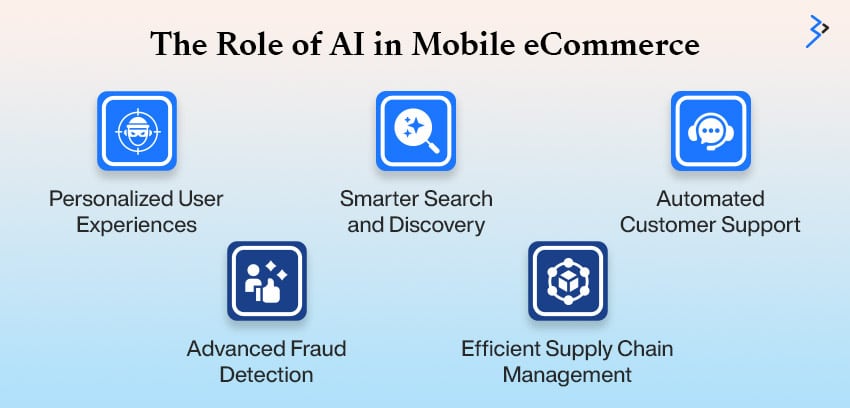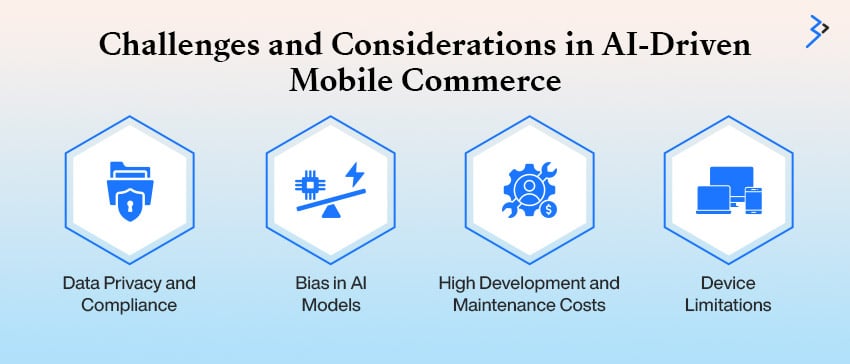Artificial Intelligence (AI) has evolved from a futuristic buzzword to a core technology driving transformation across industries. In the realm of eCommerce, particularly within mobile apps, AI is transforming how businesses engage with customers, recommend products, manage inventory, and optimize logistics.
As mobile commerce continues to grow exponentially, AI is becoming increasingly indispensable in delivering a seamless, personalized, and efficient user experience. This article examines how companies are utilizing AI in real-world mobile commerce applications to surpass the hype and generate tangible business value.
The Role of AI in Mobile eCommerce

Mobile commerce (m-commerce) has rapidly transformed the retail landscape. With more consumers relying on smartphones for shopping, today’s eCommerce platforms must do more than just offer a mobile-friendly interface—they must deliver intelligent, personalized, and seamless experiences. This is where Artificial Intelligence (AI) steps in, powered by advanced Artificial Intelligence development services.
AI is revolutionizing mobile eCommerce by enhancing nearly every aspect of the user journey. From the moment a shopper opens an app to the final click on the checkout button, AI ensures the experience is faster, smarter, and more tailored to individual needs.
Here’s how AI is playing a game-changing role in mobile eCommerce:
- Personalized User Experiences: AI analyzes browsing history, past purchases, and preferences to offer personalized product recommendations and promotions.
- Smarter Search and Discovery: With AI-powered visual and voice search, users can quickly and accurately find what they need—even if they don’t know the exact product name.
- Automated Customer Support: AI-driven chatbots and virtual assistants offer instant support, reducing wait times and enhancing customer satisfaction.
- Advanced Fraud Detection: AI monitors transactions in real-time, identifying and blocking suspicious activity to ensure secure payments.
- Efficient Supply Chain Management: Predictive analytics helps optimize inventory levels, reduce waste, and improve delivery times.

These innovations do more than just impress users—they boost key metrics. Retailers see higher conversion rates, improved customer retention, and increased operational efficiency.
In an era where speed and convenience are everything, integrating AI into mobile commerce isn’t just a competitive advantage—it’s a necessity. By tapping into the power of AI, businesses can stay ahead of consumer expectations and drive sustainable growth in the mobile-first economy.
Read More – Mobile Apps & Technology – The Best Tools for Retailers to Thrive in Ecommerce World
1. Personalized Recommendations: Amazon’s AI Engine
Amazon has long been the benchmark for personalized shopping experiences. Its recommendation engine is responsible for approximately 35% of total sales, showcasing the power of AI.
How it Works:
Amazon’s recommendation system uses machine learning algorithms to analyze:
- Browsing history
- Purchase behavior
- Items viewed and searched
- User-generated ratings and reviews
Based on this data, Amazon generates personalized product suggestions in real-time.
Why it Works:
- Continuously updated algorithms
- Cross-device data integration
- Predictive modeling
Key Technologies:
- Collaborative Filtering
- Deep Learning (Neural Networks)
- AWS Personalize
Business Impact:
- Higher average order values
- Increased customer retention
- Enhanced user satisfaction
2. Visual Try-Ons: Sephora’s Virtual Artist
Beauty and cosmetics retailer Sephora has redefined the mobile shopping experience with its Virtual Artist tool. Using AI and Augmented Reality (AR), the app allows users to try on makeup products in real-time using their smartphone cameras.
How it Works:
- Facial recognition algorithms detect facial features
- AR overlays product simulations on live images
- AI suggests products based on skin tone and preferences
User Benefits:
- Confidence in purchasing without a physical trial
- Engaging and interactive user experience
- Fewer product returns
Technologies Used:
- ModiFace AR SDK
- Computer Vision
- Skin tone analysis AI models
Business Results:
- Increased conversion rates
- Boost in app engagement time
- Stronger customer loyalty
3. Conversational Commerce: H&M’s Chatbot Stylist
Fashion brand H&M has incorporated AI-powered chatbots into its mobile app to function as personal stylists. These bots interact with users through natural language conversations to provide outfit suggestions and answer fashion queries.
How it Works:
- Chatbot engages users with questions on style preferences
- AI analyzes responses to recommend outfits
- Links to buy products directly in the app
Customer Advantages:
- Personalized shopping assistant
- Fast and convenient browsing
- 24/7 availability
Underlying Technology:
- Natural Language Processing (NLP)
- Machine Learning Development (ML)
- IBM Watson or Google Dialogflow
ROI for Businesses:
- Reduced customer service load
- Increased product discovery
- Improved user engagement metrics
4. Visual Search: ASOS and Pinterest-style Discovery
British fashion retailer ASOS offers a visual search feature in its mobile app that allows users to upload a photo of an outfit or product they like. The app returns visually similar items available in its catalog.
How it Works:
- The user uploads an image
- AI uses convolutional neural networks (CNNs) to analyze visual elements
- Matches with catalog items based on patterns, colors, and shapes
Advantages:
- Seamless product discovery
- Better user experience
- Increased likelihood of purchase
Tools and Frameworks:
- Google Cloud Vision API
- Clarifai or ViSenze visual search SDKs
Business Gains:
- Higher conversion rates
- Increased product views
- Engagement with visual-centric audiences (Gen Z, Millennials)
5. Inventory Optimization: Zara’s Predictive Analytics
Fast-fashion giant Zara uses AI behind the scenes to streamline its supply chain and inventory distribution. The app communicates with backend systems to ensure that popular products are available in the right places at the right time.
How AI Helps:
- Monitors buying patterns in real-time
- Predicts demand for different geographies
- Automates stock replenishment decisions
Key Technologies:
- Predictive Analytics
- Data Mining
- Real-Time Inventory Management APIs
Business Outcomes:
- Reduced overstock and stockouts
- Improved profit margins
- Greater supply chain agility
6. Voice Shopping: Walmart’s AI-Driven Convenience
Walmart has tapped into voice technology by partnering with Google Assistant. Users can shop via voice commands using Walmart’s app or smart speaker integrations.
How it Works:
- AI interprets voice commands
- Matches items to the user’s purchase history
- Adds products to the shopping cart
User Advantages:
- Hands-free convenience
- Speedy shopping experience
- Accessibility for visually impaired users
Tech Stack:
- Google Assistant SDK
- Natural Language Understanding (NLU)
- AI-powered shopping cart algorithms
Impact:
- Expansion into smart home devices
- Enhanced app usability
- Improved brand accessibility
7. Fraud Detection and Secure Payments: eBay and PayPal
Mobile payment security is paramount in eCommerce. eBay and PayPal employ AI to detect and prevent fraudulent transactions in real-time.
Features:
- Behavior-based risk scoring
- Geo-location tracking
- Anomaly detection using ML
Technologies Used:
- Supervised and Unsupervised Learning
- Biometric Analysis
- AI-based Transaction Monitoring Systems
User Confidence:
- Safer transactions
- Faster checkouts
- Lower cart abandonment rates
Business Benefits:
- Minimized chargebacks
- Stronger compliance
- Enhanced reputation
8. Dynamic Pricing: Airbnb’s Smart Rate Adjustment
Although not a traditional retailer, Airbnb’s dynamic pricing model is a perfect case study for mobile commerce, highlighting the impact of effective mobile commerce development services. The app uses AI to automatically adjust listing prices based on demand, season, and local events.
How it Works:
- AI scrapes data from competitors and local trends
- Adjusts prices in real-time
- Suggests optimized pricing to hosts
Benefits:
- Maximized revenue for hosts
- More competitive listings
- Higher booking rates
AI Tools:
- Regression Models
- Forecasting Algorithms
- Data Crawling APIs
Application for Retailers:
eCommerce apps can use similar strategies for flash sales, seasonal pricing, or competitor-based adjustments.
9. Sentiment Analysis and Customer Feedback: Nike
Nike utilizes AI to monitor app reviews, social media marketing comments, and customer support tickets, deriving insights into customer sentiment. This helps improve product offerings and app features.
How it Works:
- Collects text data from multiple sources
- Uses NLP to analyze tone and emotion
- Flags recurring issues and suggestions
Value to Users:
- Feels heard and valued
- Rapid updates based on feedback
- Customized communication
Technology Stack:
- TextBlob or VADER for sentiment analysis
- Python-based data pipelines
- BigQuery or Amazon Redshift for data aggregation
Business Outcomes:
- Product improvement cycles
- Better user experience
- Higher app ratings
10. AI-Powered Content Curation: Netflix and Spotify Model for eCommerce
Netflix and Spotify have revolutionized content recommendation. eCommerce apps can adopt similar strategies for curated product feeds based on:
- User behavior
- Trending products
- User-generated content
How it Works:
- Analyzes users’ browsing and purchasing history
- Builds content playlists of products or collections
- Updates feed dynamically
Benefits:
- Enhanced discovery
- User retention through personalization
- Increased average session time
Integration Tools:
- TensorFlow
- AWS SageMaker
- OpenAI embeddings for semantic matching
Read More – Scaling eCommerce Success with Adobe Experience Manager and Cloud Integration
Emerging Trends in AI for Mobile Commerce

As mobile commerce continues to grow, AI is evolving beyond basic personalization and automation to power next-gen shopping experiences. Innovative trends are reshaping how brands connect with users, improve engagement, and drive conversions—all through the convenience of a smartphone.
Here are some of the most exciting AI trends emerging in mobile commerce:
- AI-Generated Product Descriptions: Platforms like ChatGPT and Jasper are revolutionizing content creation by generating engagement. An SEO agency can help you create SEO-friendly product descriptions at scale to boost visibility and drive traffic. This not only speeds up the process but also ensures consistency and boosts organic traffic.
- Emotion AI: Also known as affective computing, Emotion AI analyzes facial expressions, voice tone, and even text sentiment to understand user emotions. Brands can utilize this insight to tailor in-app responses, recommend mood-appropriate products, and foster more empathetic customer interactions, ultimately leading to increased satisfaction and higher conversion rates.
- AI-Powered Loyalty Programs: Traditional punch-card rewards are being replaced with intelligent, gamified systems. AI analyzes purchase behavior and engagement patterns to predict which rewards will most effectively motivate users. It then dynamically adjusts loyalty offers to keep users interested and coming back.
These cutting-edge trends are not just about enhancing user experiences—they’re about anticipating user needs, optimizing engagement strategies, and building stronger brand relationships. As AI becomes more sophisticated, mobile commerce platforms that embrace these innovations will lead the way in creating smarter, more human-like shopping journeys.
In a crowded digital marketplace, staying ahead of the curve with AI-driven trends isn’t optional—it’s essential for sustained growth and customer loyalty.
Read More – Top SAST Tools for Mobile App Security Testing
Challenges and Considerations in AI-Driven Mobile Commerce

While AI offers transformative benefits for mobile commerce, its integration comes with several challenges that businesses must carefully navigate. From technical hurdles to ethical considerations, adopting AI is not a plug-and-play process—it requires thoughtful planning and strategic execution.
Here are some key challenges businesses face:
- Data Privacy and Compliance: Collecting and processing user data must align with regulations like GDPR and CCPA. Mishandling sensitive information can lead to fines and a loss of consumer trust.
- Bias in AI Models: If not properly trained, AI systems can inherit biases from data, leading to unfair or inaccurate outcomes. This can negatively affect product recommendations and customer interactions.
- High Development and Maintenance Costs: Building, training, and maintaining AI models—especially for personalization and real-time analysis—can be expensive and resource-intensive, especially for smaller businesses.
- Device Limitations: Mobile devices have limited processing power and battery life, which can hinder the deployment of heavy AI models directly on smartphones.
To address these issues, businesses are turning to innovative solutions:
- Edge Computing: Processes data locally on devices to reduce latency and reliance on cloud servers.
- Federated Learning: Enables model training across decentralized devices while keeping user data private.
- AI-as-a-Service (AIaaS): Lowers the technical barrier by offering scalable AI tools and models through cloud-based platforms.
By understanding and planning for these challenges, businesses can responsibly implement AI in mobile commerce, ensuring smarter solutions that do not compromise user trust, compliance, or performance.
Conclusion: Moving from Hype to Value
The application of AI in mobile eCommerce apps is no longer a futuristic concept. It’s happening now, and it’s delivering measurable business value. From improving product recommendations and inventory management to revolutionizing customer support and visual search, AI is transforming mobile commerce into a smarter, more efficient, and more engaging experience.
As businesses continue to adapt and innovate, those who embrace AI thoughtfully and strategically will be the ones who not only survive but thrive in the mobile-first retail landscape.
Whether you’re a global brand or an emerging startup, the message is clear: AI is not just a competitive edge—it’s a digital necessity.
Need help implementing AI in your eCommerce mobile app? Let’s talk about how to bring your vision to life.
FAQs
AI enhances personalization by analyzing user data such as browsing history, purchase behavior, and preferences to deliver tailored product recommendations, personalized content, and dynamic pricing strategies—all in real time.
Examples include Amazon’s AI-powered recommendation engine, Sephora’s Virtual Artist for virtual try-ons, H&M’s chatbot stylist, and ASOS’s visual search. These implementations have boosted user engagement, conversion rates, and customer loyalty.
While advanced AI models can be costly, many affordable tools and AI-as-a-Service platforms like Google Cloud AI, AWS Personalize, and OpenAI APIs make AI more accessible for startups and small businesses.
Yes. AI reduces cart abandonment by offering personalized follow-up messages, optimizing product recommendations, streamlining checkout processes, and using predictive analytics to address barriers to purchase.
Common challenges include data privacy concerns, high model training costs, bias in AI algorithms, and performance limitations on mobile devices. These can be mitigated with cloud-based AI tools, federated learning, and careful compliance planning.
Related Articles
-
The Future of AI Agents: How Intelligent Automation Is Transforming Enterprise Workflows
We’re entering a new era of automation~ smarter, faster, and more human-like than ever. For years, businesses used basic automation to handle repetitive tasks, but those tools couldn’t adapt or
-
Top Logo Design Tools to Elevate Your Brand Identity in 2025
Introduction Creating a unique and professional logo is essential for any business or individual looking to build a strong brand identity. A logo is often the first thing people notice,
-
Chatbots and Their Impact on Customer Support
Introduction In today’s digital age, where customer expectations are sky-high, businesses constantly seek innovative ways to enhance customer experience (CX). Enter chatbots – virtual assistants that are revolutionizing the customer




